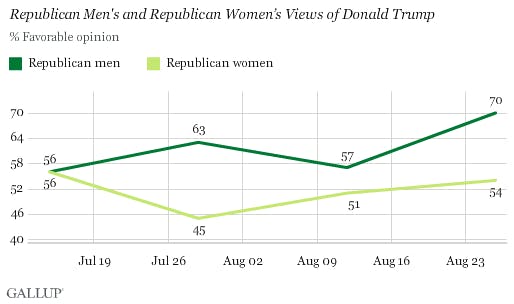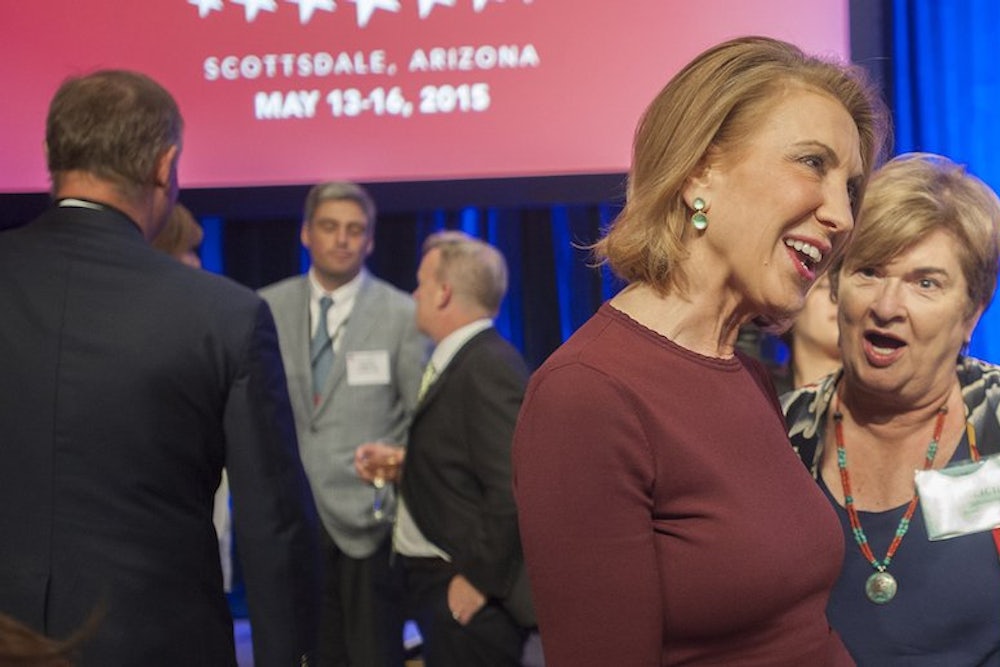The world was different more than four months ago when Carly Fiorina launched her 2016 presidential campaign by saying, “it’s time to declare the end of identity politics.” Back then, there were only six Republican candidates running for president, Rick Perry had high hopes of a political comeback, and pundits still regarded rumors of Donald Trump entering the race as an elaborate reality-TV ploy.
Since everything else has turned upside down in the interval, you’ll have to forgive the ex-Hewlett Packard CEO for adopting a new campaign tactic over the last couple of weeks. Fiorina is already doing better than anyone but herself might have expected: She’s tied for sixth place, and is the only candidate to graduate from the undercard debate in August to the primetime slot at the second GOP presidential debate. Now comes her moment on a national stage to try out that new strategy she has for standing out amid a sea of men in ties: Fiorina has taken to speaking directly to conservative women, asking them to join her if they can’t stand sexism from the likes of Donald Trump.
As is usual these days, Trump himself was the catalyst for Fiorina’s new strategy, when he remarked on Fiorina’s appearance in a Rolling Stone article published on Sept. 9: “Look at that face! Would anybody vote for that?” While more seasoned candidates have tried and failed to troll Trump to gain attention—Bobby Jindal is still trying and failing—Fiorina’s response to the provocation has been spot-on. In remarks last week, which were highlighted in an ad created by her super PAC on Monday, Fiorina said, “Ladies, look at this face. And look at all your faces. The face of all leadership.” The ad ends, “This is the face of a 61-year-old woman. I am proud of every year and every wrinkle."
For Fiorina, this is surprisingly feminist talk. She is, after all, a candidate whose book describes modern-day feminism as “an orthodoxy that seeks to portray all men as the enemy and women as requiring the constant assistance of government.” And unlike Hillary Clinton, notes GOP pollster Kellyanne Conway, Fiorina has “never said I’m running to be the first woman president of the United States.”
From the start, Fiorina’s pitch has been that she is the antidote to Clinton’s “playing the gender card.” But all along, Fiorina has played it subtly herself, gladly exploiting some of the GOP’s image problems among women voters while denying that those problems actually exist. She's touted her advantages as the only woman running for president, while obliquely discussing the challenges Republican nominees have faced in the past with women voters: "I think that if Hillary Clinton were to face a female nominee, there are a whole set of things that she won’t be able to talk about," Fiorina has been saying in her standard stump speech. "She won’t be able to talk about being the first woman president. She won’t be able to talk about a war on women without being challenged." Last week, while Fiorina was encouraging other GOP women to look around them at "the face of leadership in our party, the party of woman’s suffrage,” she still said precious little about the current state of said party.
But now she’s easing into confronting sexism far more directly. Fiorina has talked throughout the campaign about confronting it in the media and the business world—but usually in very general terms, the way she talks about the Republican Party and women. It was eye-opening last month when Fiorinia told an interviewer that it was “sexist” to ask if she was running to get a vice presidential nomination. But her gender-talk has grown sharper and more overt, thanks in part to Trump. In August, even before Trump lobbed personal insults at Fiorina, CNN’s Jake Tapper asked her to reply to comments the frontrunner made on Fox News anchor Megyn Kelly (“blood coming out of her wherever") after the first GOP debate. Fiorina didn't mince words: “I've had lots of men imply that I was unfit for decision making because maybe I was having my period.” She added, “women understood that remark. And yes, it is offensive.”
Fiorina’s newfound gender politics only goes so far, however. While the only woman in the GOP race has been happy to fire back at Trump’s sexist comments, she is still trying to avoid criticizing Republicans in any larger way. Fiorina might make an appeal to female solidarity, “proud of every wrinkle,” but at the same time, she still won’t admit that Republicans have a substantive problem with women voters.
Granted, it would be hard, if not impossible, for Fiorina to suddenly set herself up as some kind of anti-“war on women” candidate. She denies there's any such war, for one thing. And her policy stances on issues important to women mirror most of her rivals’ positions: She supports strict limits to women’s access to abortion, denies that discrimination plays a role in the gender wage gap, and opposes mandated paid family leave and Common Core.
It would be equally awkward for Fiorina to run against the Republican Party’s record on women, given that much of her political career has been devoted to defending the Republican establishment. She’s not quite an “insider” herself, at least in Beltway terms, but Fiorina was John McCain’s economic adviser in 2008 and served as California co-chair of Mitt Romney’s campaign in 2012. And what she was best known for prior to her presidential run—aside from leaving Hewlett-Packard in disgrace and running a failed U.S. Senate campaign in 2010—was appearing on cable news as a talking head to defend the GOP’s opposition to abortion rights or insurance coverage for birth control.
But while Fiorina will likely continue to tread lightly when it comes to Republicans and women, she is free to go after Trump. Because of Trump’s own outsider status in the campaign, Fiorina can cast him as a special case; in fact, she has laid the ground for months by sharply questioning Trump’s Republican credentials and calling him a mere “showman.” And by sparring with Trump on gender issues, she doesn’t run the risk of giving the GOP a bad name, and thus making a bad name for herself with the party. Voters, polls show, tend to associate Trump with the Republican Party.
By responding to Trump’s sexism, then, Fiorina doesn’t have to make a broader statement about the party’s views on women. That’ll keep her in good stead with party leaders. But can it lift her substantially higher in the polls? It’s unclear how much headway Fiorina will make with Republican women by aiming her barbs only at Trump (and Clinton), while continuing to defend the party’s record on women. As Debbie Walsh, director of the Center for American Women in Politics at Rutgers University, asks: “Will the gender card which she is loath to admit she is playing—will talking about gender—appeal directly to women voters?”
There is an opening: Republican women have been turning away from Trump. Since mid-July, Gallup polling finds that it’s been only men who’ve accounted for Trump’s rise in the polls; among women, he is actually down two points, a trend that began even before he commented cuttingly on the looks of Fiorina and Megyn Kelly.

But there is no guarantee that Fiorina will pick up all the women abandoning Trump, or even the majority of them. “The question is, can she pull Republican women in this primary process in a way men cannot?” Walsh asks. “Polls are showing Trump is losing ground among women, but the question is, where are they going? To her, or are they going to Ted Cruz and Jeb Bush?”
GOP women are showing little taste for gender-based appeals—and what makes Fiorina primarily stand out from other Republican candidates, aside from her business experience and claim to being a political “outsider,” is the fact that she’s a woman. Conway’s firm conducted a straw poll at the National Federation of Republican Women convention over the weekend, and while Fiorina won (it surely didn’t hurt that she spoke there on Friday), the GOP women ranked “great message and outreach to women” low on their list of priorities for a presidential nominee. Only one-quarter said they would weigh outreach to women heavily when they vote.
The CNN debate may convince more of those voters to turn to Fiorina. It will be her most visible moment in the race to date, and Fiorina has shown that she’s comfortable with being aggressive and going into attack mode. But will she seriously confront Trump on his misogyny, or make direct appeals to Republican women on the basis of gender? Will Fiorina do more than subtly hint at her party’s troubles with women voters, if that? If the candidate reverts to form, she'll throw in her usual one-liner about Clinton, take a jab at Trump, and keep on insisting that her campaign is nothing but gender-neutral.
